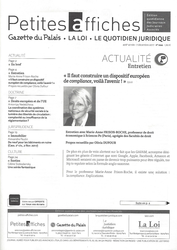June 17, 2021
Compliance: at the moment

► Compliance Law and Competition: for building, is it necessary to legislate ? Example of quasi-public interest judicial agreement: the French Competition Authority's Statement of June 3, 2021 on Facebook
The French law so-called "Sapin 2" of 2016, organized the "convention judiciaire d’intérêt public - CJIP" (Public Interest Judicial Agreement) which allows the prosecutor to undertake not to prosecute a company in returns for this company's commitments for the future. Is this mechanism reserved for this law, which only concerns corruption and bribery? The answer is often positive.
Is it so obvious?
Since the entity having the power to prosecute therefore always has the power not to prosecute. As the company always has the freedom to make commitments for the future. And everything stops.
News in Competition Law illustrate this. On June 9, 2021, as part of a transaction, the Autorité de la concurrence (French Competition Authority) sanctions Google (➡️📝 Communiqué of the Autorité de la Concurrence , translated in English by the French Competition Authority) , which has not contested the facts, for abuse of dominant position for having privileged its services in the online advertising services. Similar facts were alleged against Facebook. But on June 3, 2021, the Autorité de la concurrence (French Competition Authority) published a "communiqué de presse" (➡️📝statement translated in English by the French Competition Authority) saying that Facebook has, during the investigation, proposed commitments regarding its future behavior. It is remarkable that this statement on Facebook is published as an “acte de régulation” (regulatory act).
Yes, it is indeed an regulatory act about the future and structuring the online advertising area, internalized in this company which engages itself in its future behavior. With its statement, the Competition Authority invites the “acteurs du secteur” (actors of this sector) to make observations, for the development of what will be a sort of compliance program.
In these negotiations which are akin to a game table, where everyone calculates without knowing if they enter into a negotiation or a confrontation, the first game assuming that one shows more cards than in the second, it is indeed towards a kind of Public Interest Judicial Agreement that they are going with a Competition Authority which is both Judge and Prosecutor, concludes the agreement and, through a later decision, gives it force. Under the various legal qualifications, it is indeed the same general mechanism of Compliance Law, well beyond the specific French law known as Sapin 2.
Managed in this way, Compliance Law being an Ex Ante corpus, transforms the Competition Authority, an Ex Post Authority, into an Ex Ante Authority, openly taking "acte de régulation" (Regulatory Act), and allows it to rely on the power of companies, thus “committed”, to structure markets, which are however not regulated. Like advertising or retailing areas (➡️📝see Frison-Roche, M.-A., From Competition Law to Compliance Law: Example of French Competition Authority's decision on central purchasing body in mass distribution, 2020).
Thus Compliance Law has achieved the autonomy of Regulatory Law with regards to the notion, which nevertheless seemed intimate to it, of "sector".
July 18, 2018
Thesaurus : 05.2. Commission européenne
Full reference: European Commission, 18th of July 2018, Decision relating to a proceeding under Article 102 of the Treaty on the Functioning of the European Union and Article 54 of the EEA Agreement, Google Android, Case AT.40099
Feb. 6, 2018
Thesaurus : 09. Juridictions étrangères
Dec. 7, 2017
Interviews

Référence complète : FRISON-ROCHE, M.-A., Il faut construire un dispositif européen de compliance, voilà l'avenir !, in Actualité/Entretien, Petites Affiches, propos recueillis par Olivia DUFOUR, n° 244, 7 déc. 2017, pp. 4-6.
Entretien donné à propos de la sortie de l'ouvrage Régulation, Supervision, Compliance.
Réponse aux questions suivantes :
- Quels sont les buts que vous assignez à la Compliance ?
- Que signifient ces deux concepts que vous introduisez : service public mondial et buts monumentaux ?
- Que devient l’État face à une entreprise globale ?
- Que pensez-vous du lanceur d'alerte ?
- Comment est affectée la relation entre l'Europe et les États-Unis ?
- Par la Compliance, les entreprises ne vont-elles pas gouverner le monde ?
______
July 7, 2016
Interviews

Référence complète : Frison-Roche, M.A., Les droits des personnes, Internet et la CNIL, Dalloz - Etudiants, 7 juillet 2016.
Les questions posées ont trait à :
- la décision de la CNIL, Numericable, quant à la nature de l'obligation des opérateur numériques de transmettre des informations aux autorités ;
- la nature de cette obligation ;
- la portée du "droit à l'oubli", tel qu'il ressort de l'arrêt Google Spain de la CJUE ;
- les enseignements de la querelle entamée par Google sur l'espace d'effectivité du déréférencent impliqué par ce droit à l'oubli.

Updated: June 18, 2016 (Initial publication: Nov. 8, 2015)
Publications

This Working paper will be used to support an French written article to be published in a book, set in the media/assets/couvertures/couverture-
This working paper was the basis for intervention in the symposium organized by the internet-espace-/">Journal of Regulation,
View the slides used as support at the conference (in French).
____
After emphasizing that the concept of "data" is uncertain, the first perspective is to draw the regulatory consequences of the fact that what is often referred to as the "object" of the data item (the person, the company for financial data, the economy for rating data, etc.), is only its source, "underlying", the data which is manufactured by a company : the real objet of the data is its purpose being the use for which the data is intended. The data is independent its underlying, is consolidated in the affected masses, takes an economic value based on the desires that have users, becomes available outside of time and space in the digital. This implies a specific
But the data is also the Janus of digital because new black gold, pure financial instrument, immaterial by nature, the data also keep a record of people, the underlying that would protect, that we would like inseparable, or the structure that one would want legitimately to attack thank to the new mechanism of
In addition, any

Oct. 23, 2014
Publications

Accéder à la présentation du colloque.
Ce Working paper a servi également de base à un article paru dans la Revue Concurrences.
Parce qu'il est difficile de réguler un "marché biface", sauf le temps fugace du contrôle des concentrations, l'idée accessible est de réguler directement l'entreprise qui tire tout son pouvoir de sa position sur une telle structure de marché.
On peut, comme le propose le Conseil d'État, dans son Rapport annuel Le numérique et les droits fondamentaux, considérer que la prise en considération par le droit de cette situation nouvelle doit prendre la forme d'une reconnaissance de la notion de "plateforme", pour l'ériger en catégorie juridique et lui associer une obligation de loyauté, sous la surveillance du régulateur des données personnelles.
L'on peut aussi recourir à une notion plus générale, ici utilisée, d'"entreprise cruciale", à laquelle correspondent des entreprises comme Google, FaceBook, Amazon, etc., parce que ces entreprises remplissent les critères de la définition, à la fois négative et positive de l'entreprise cruciale. La puissance publique est alors légitime, sans que l'État ait à devenir actionnaire, à se mêler de la gouvernance des entreprises et à surveiller les contrats, voire à certifier ceux-ci, comme en finance, sans exiger de l'entreprise ainsi régulée un comportement moral, car ces entreprises privées doivent par ailleurs poursuivre leur fin naturelle constituée par le profit, le développement et la domination, moteur du développement économique. Le développement technologique des plateformes n'en serait pas entravé, tandis que l'aliénation des personnes que l'on peut craindre pourrait être contrée.

June 2, 2014
Publications
 The expression "regulated company" may appear as an oxymoron : the State regulates areas (markets, networks, etc.) because of their structural failures, but the State doesn't enter a company that develops its activities autonomously.
The expression "regulated company" may appear as an oxymoron : the State regulates areas (markets, networks, etc.) because of their structural failures, but the State doesn't enter a company that develops its activities autonomously.But on reflection, it is sometimes necessary to "regulate a company" and this necessity is increasingly imposed. This is imperative if a company absorbs the entire area, because it is a monopoly or because it wants to become the heart of a crucial area, such as Google which has the project to become the future global brain. In a more general way, it is a necessity to locate businesses which are "crucial", banks are only one example, and organize, beyond supervision, providing direct regulation of such firms.
This regulatory power on critical firms must take the form of attendance of public power and policy within the company itself, so that the state interfere in decisions which social group suffers the consequences.
The control can go beyond this "public presence" to take the form of "public authority", the state ruling as operator. Under such conditions of "cruciality", the neutralization of "public enterprise" by the competition law must cease, the public company must be better recognized as a regulatory instrument in distance with the simple game of competition.
Jan. 1, 2013
Thesaurus : Doctrine
Référence complète : Malavoti, E. et Marty, F., La gratuité peut-elle avoir des effets concurrentiels ? Une perspective d'économie industrielle sur le cas Google, in Martial-Braz, N. et Zolynski, C. (dir.), La gratuité : un concept aux frontières de l'économie et du droit, coll. "Droit et Économie", L.G.D.J. - Lextenso éditions, 2013, p.71-89.
Accéder à une présentation générale de l'ouvrage dans lequel l'article est publié.
Accéder à une présentation complète des ouvrages publiés dans la collection "Droit et Économie".
Les étudiants de Sciences Po peuvent accéder au texte de l'article par le Drive de Sciences Po (dossier MAFR - Régulation).
Nov. 20, 2012
Blog